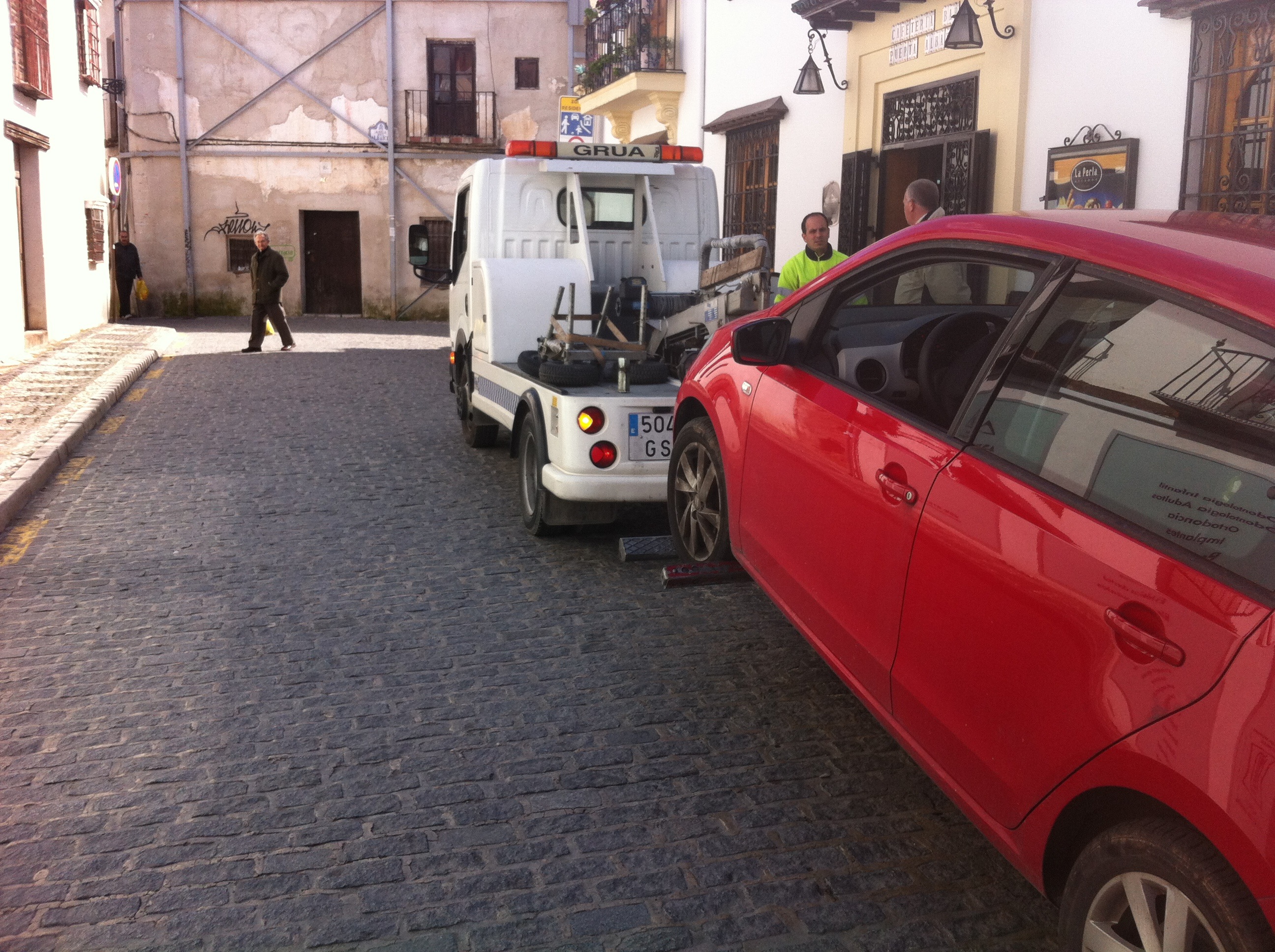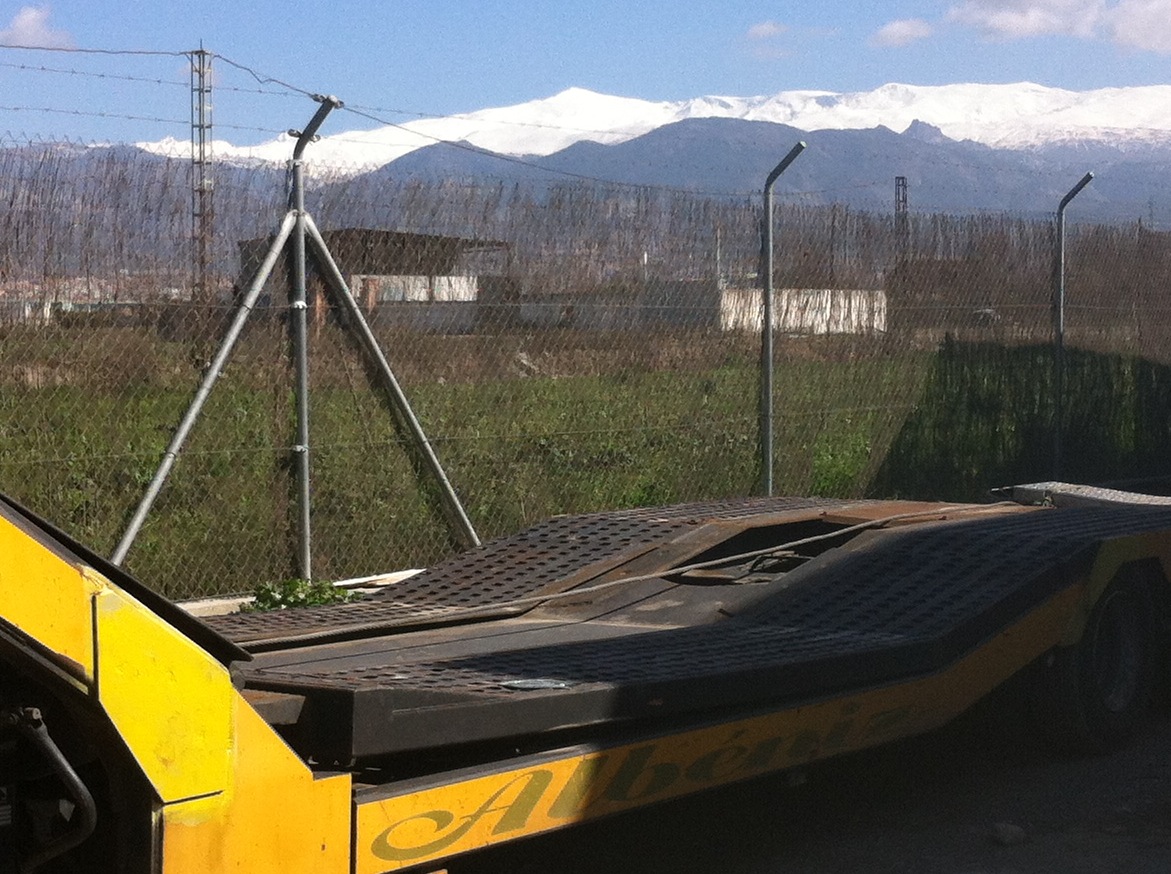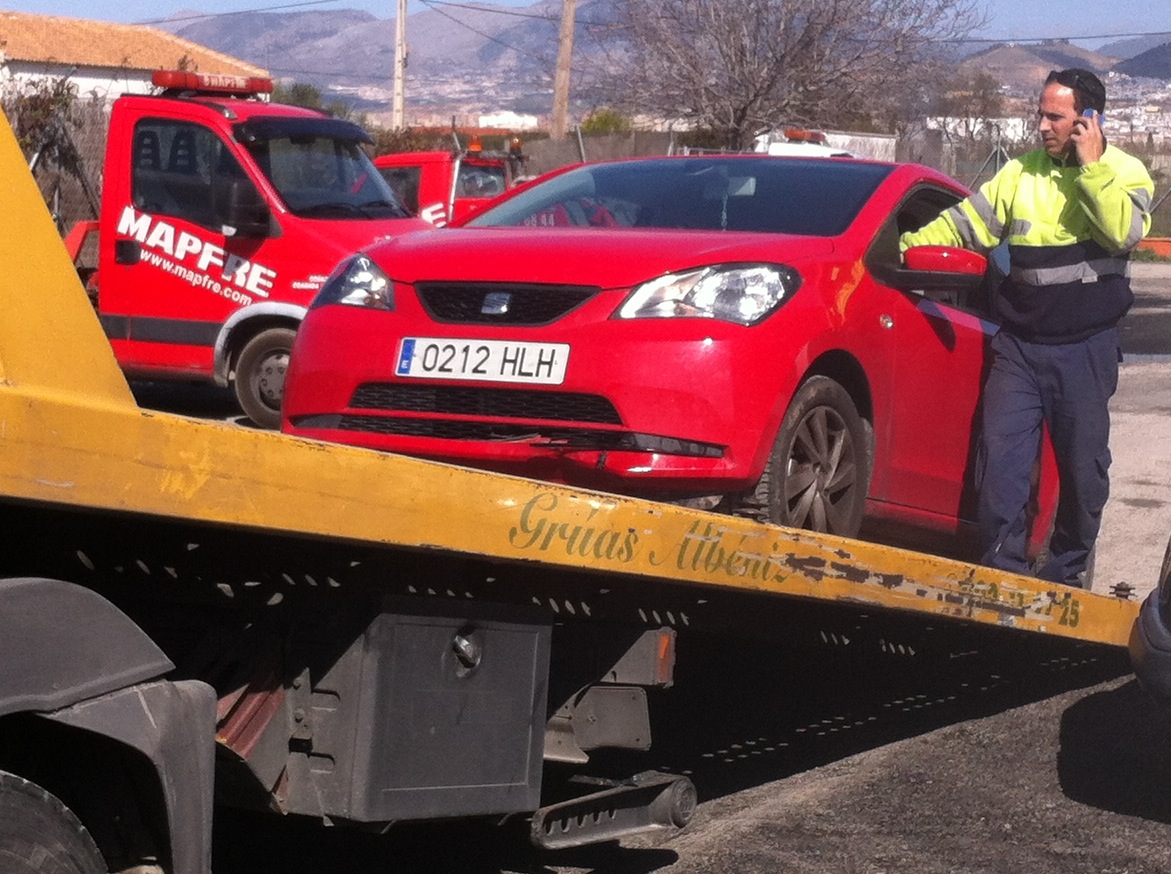It wasn't the best of days. But as the stranger who helped me said, "You can tell a lot about a person by how they react to difficult situations." He should know - he had watched two or three people every day drive into the same bollard I had driven into. He had waited with some of them, too, for the tow-truck, though some (he said) were so rude that he didn't bother.
Two lovely days in Granada, it should have been. Wandering the Albaycin, spending time with a friend, relaxing in a lovely hotel. Instead, it was a day that stretched my Spanish to its limits. A day of complicated discussions with police, insurance company, tow-truck drivers, and mechanics.
Normally I jump on the train to Granada. Pathetic, but it always seemed easier than driving in a strange city. But this time I felt brave. This time I was going to drive. I'd looked on Google Maps and found some streets that looked possible for parking, albeit within the narrow confines of the Albaycin, plus a fallback option on the approach road.
The ever-reliable sat-nav (Selina) guided me past magnificent views of the Sierra Nevada, round Granada's ring-road and up the hill to Plaza Cristobal Colon. I followed a police car into the back-streets. He stopped at a mini-traffic-light and did something through the driver's side window. I read the electronic display board to the side of the little access point. "Authorised vehicles only, and access to hotels". Fine, I had my hotel booking, all was well. After an interminable wait, the police car moved forward. I followed. The crunch when it came was the sound of metal ripping through metal, a hiss as liquid spurted out, then the front of the car rose slightly off the ground.
Invisible due to the police car ahead of me, one of those rising bollards that comes up out of the ground, had lifted behind the police car but out of sight under my bonnet. Just as the front of my car went over it, up it came. It sounded fatal. The engine stopped, by itself, the electrics ripped through.
Walking round to the front what worried me the most was the liquid hissing and flooding the ground. I touched it with a finger and sniffed - not oil or petrol, fortunately. A man came over from the nearby open-air bar table and hovered, unsure whether I needed help or not. "Que pena!" I said. What a pain. He agreed. Another bystander went to the pillar that the police car driver had done something with. There was a button to press. A woman answered. I heard the man tell her that "another car has hit the pillar". Another? You could hear her sigh. She said she would send the police, and the man to fix the bollard.
Other cars began to queue behind mine, waiting to go through the narrow gap. Knowing the police were on their way, I remembered to put on my yellow fluorescent jacket. I waved the cars round the other side of the pillar when there was nothing on that side of the road. The first man then asked if there was anything he could do. I said I wasn't sure what the process was, what to do next. He said the police would come but that I needed to organise the grua - the tow-truck. I looked a bit blank. He asked if I had car insurance. Yes of course I do. Well, he said, normally they organise the grua. Encendió una bombilla! A lightbulb came on in my head! Yes of course. The car insurance includes roadside assistance. I dug out the card from the glovebox and called them.
She needed my number plate, for identification. Is my Spanish accent so bad? A dozen times I repeated it. At one stage she asked me if I could please speak in Castillian. Huh? I don't speak any other Spanish languages (though perhaps I was being too Andaloo for her refined Madrid ears). Seeing my frustration Manolo, the first bystander, took the phone. I was somewhat relieved that he too had to repeat the number eight times before she finally got it! He returned my phone and she asked for the location of the vehicle. Oops! No idea! I asked Manolo. Calle Pagés he said. I told her. "Qué?" she said. “CALLE PAGES” I shouted. Checking the spelling with Manolo, I spelled it out slowly for her. "QUÉ???" she shouted back. Six attempts to spell it (it's not a long word ....) then I passed the phone to Manolo who eventually got it through to her after six further attempts. Not just me then .....
Finally she confirmed that the grua was on the way, I wouldn't have to pay anything, and it would take me and the car to the workshop of my choice.
Dilemma. I wanted my two days in Granada, and the hotel was one of those bargain non-refundable deals. But the prospect of being carless was too scary so I elected to go back with the car to Colmenar and put it in the safe hands of my good friend and mechanic Antonio. The insurance company confirmed that was fine and she booked the grua to return me home.
At that moment the police arrived. Two tall police officers, smiling, handsome. A bad day got a tiny bit better. I apologised profusely and said I had been really stupid. No no, they reassured me. It happens several times a day. I explained I was a tourist and it was my first time driving in Granada. They said not to worry. Just then the man from the Ayuntamiento turned up to fix the rising bollard. Realising that I was using up police time AND had damaged town council property, I asked if it was un delito - an offence. They laughed (they both looked even more handsome when they laughed ....). No, stop worrying, they said. We just have to make a note of the incident, nothing more. Have you got your papers? For yourself and for the car? Oh yesssss ..... when in Spain, carry ALL papers at ALL times. I dug it all out. All fine. A moment of panic when they asked for the receipt to show that the insurance was current. Phew, there it is, tucked behind the Permiso de Circulación.
I explained what had happened. That the police car had blocked my view. They laughed again (SOOooo gorgeous!). They wrote up my statement, I read it through and signed it. They gave me something with a number on it as a record. The police, Manolo and another bystander pushed the car onto the kerb, the town council man finished fixing the bollard, and the road re-opened.
Waiting for the grua, I bought Manolo an espresso. Currently unemployed, he sits in the little square most days, and witnesses two or three confrontations with the rising bollard every day. He said you can tell a lot about people from their reactions to an incident. Some shout at their car, some shout at the bollard, many shout at the bystanders (why?) and almost all shout at the police. He said I seemed very calm. Not really, I said, but what can you do?
 Then the tow-truck arrived. Victor turned around efficiently, despite the narrow street, swung the grua into position, and generally gave the impression of having been there before. Spotting Manolo sitting with me, he came over. They greeted each other. Clearly a regular experience for both of them. The bar owner came out unasked with Victor's espresso doble - more confirmation that this had happened more than once!
Then the tow-truck arrived. Victor turned around efficiently, despite the narrow street, swung the grua into position, and generally gave the impression of having been there before. Spotting Manolo sitting with me, he came over. They greeted each other. Clearly a regular experience for both of them. The bar owner came out unasked with Victor's espresso doble - more confirmation that this had happened more than once!
Victor efficiently loaded my little car onto the small grua and explained that he could only bring the small one into the narrow streets of the Albaycin, and that we would go to his base outside the city and transfer onto a larger grua. He enjoys his job. Well, who wouldn't?  he asked. Thanks be to god he HAS a job, he said, and on top of that he enjoys driving. At that moment we swung round a corner and the majesty of the snow-capped Sierra Nevada filled our vista. I could only agree with him. There are worse places to work.
he asked. Thanks be to god he HAS a job, he said, and on top of that he enjoys driving. At that moment we swung round a corner and the majesty of the snow-capped Sierra Nevada filled our vista. I could only agree with him. There are worse places to work.
At the base I was handed over, like a moderately valuable package, to Jose Luis who would drive me and my car to Colmenar. He loaded it onto the bigger grua. He said he was happy to go to Colmenar, he'd been from school once and he remembered the honey museum. Then his phone rang. His wife wondered if he could collect their 5-year-old from school today. A quick renegotiation with his workmates, and the  package - me - was passed over to Antonio. Jose Luis jumped into his battered Seat Ibiza and headed off to primary school. I climbed up into the cab with Antonio.
package - me - was passed over to Antonio. Jose Luis jumped into his battered Seat Ibiza and headed off to primary school. I climbed up into the cab with Antonio.
He likes his job too. He likes the long drives best, and he prefers it when he takes the customer as well. He's chatty. His daughter works in Málaga and when he visits her he sometimes takes the coast road and sometimes the inland route via Casabermeja that we were taking to Colmenar. No sat-nav in sight, he knows all the roads. Sometimes the customers are a bit grumpy, he said. Obviously he only meets people who are having a bad day, he joked. Nobody wants to be on a grua. But what can you do? He talked about the crisis, about people without work. He talked about the banks, the cost of electricity, and the price of houses. He asked a lot of questions about England. He had quite strong views about British immigrants in Spain who don't learn the language.
The time flew by and we rolled into Colmenar and to the workshop where Antonio was waiting for us. I introduced Antonio mecanico to Antonio driver and together they rolled my car into the workshop. More paperwork to sign (marca de España, we agreed) and then it was time for Antonio's diagnosis. Two new radiators needed but nothing fatal. If I had been two seconds further forward the bollard would have come straight up through the engine. I was lucky - just radiators and the front grille.
How does that Mastercard advert go?
- Missing out on two days in Granada - annoying
- Losing the cost of the hotel - frustrating
- Admiring my two police officers – amusing
- Speaking fairly technical Spanish in serious non-social situations – challenging
- Five hours of non-stop (free!) Spanish lessons - invaluable
- Being told my Spanish was good by police, insurance company, Manolo and two grua drivers - priceless.
Oh and the cost of repairs? Well, there’s always Mastercard.
© Tamara Essex 2014
THIS WEEK'S LANGUAGE POINT:
We had to do an exam this week. But it was for homework, so not exactly under exam conditions! It wasn’t too bad, though I don’t know how it went as it’s been handed in for marking. But there was one that really stumped me for a while. It was about the use of “poco”. And that difficult “poco” or “poca” thing. Simple enough if poco is being used directly as an adjective – es un poco caro para mi – it’s a bit expensive for me. Estuvo en la playa con poca ropa – she was on the beach with few clothes on. But it’s when poco is being used as a determiner …. As in No quiero una casa poco luminosa – I don’t want a house less bright. I don’t remember why, but I do remember learning that in that example we use poco, even though everything is screaming that it ought to be poca – to agree with casa and luminosa.
Well after much agonising I ticked POCO. I’ll find out next week if it was right or wrong. In the meantime, are there any English teachers able to confirm what part of speech that is, and any Spanish teachers able to explain why it should be poco?